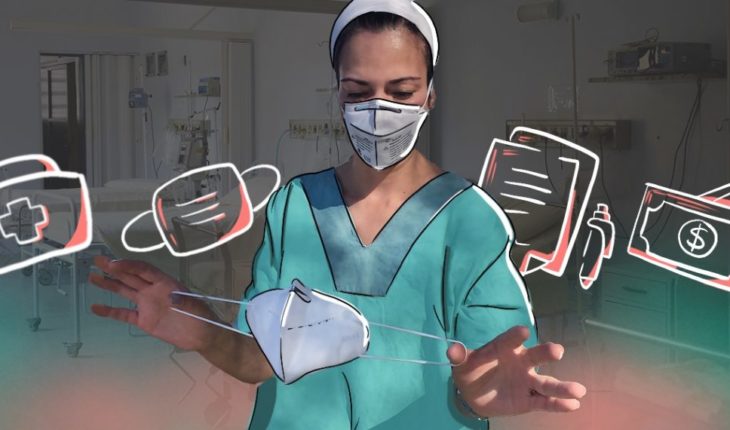The Mexican Social Security Institute (IMSS) in Baja California hired a computer services company that was required to deliver N95 covered to medical staff, however, as they have not arrived, doctors and nurses have had to buy their own material on the U.S. black market to protect themselves from COVID-19.
The contract with Cellaruim SA de CV. by 12 million pesos to acquire 110 thousand N95 missingkers and has not been cancelled.
That medical materials contract was made with a computer services company, and it was so patchy that public policy researchers suspected a simulated operation.
ImSS omitted that the price offered by the cover was 370% below the market price.
Read: Governors accuse distribution of poor quality medical equipment; are for low-risk personnel: Health
José Antonio Castillo, an official responsible for the purchase, could not answer why he bought from a company with no experience in medical products, almost four times below the average offer in Mexico.
Pablo Montes, anti-corruption coordinator at the Mexican Institute for Competitiveness (IMCO), says the company could be ghost.
“Yes all the warning signs ring,” he said in an interview. For this report was visited the address presented by Cellarium in the contract with IMSS, and it turned out to be a house in a private neighborhood.
“There are pure houses here, no business,” said the security guard of Private St. Patrick, which could not be accessed.
Cellarium is located in San Ignacio 5685-12, Colonia Las Américas, east of the city. One of the Members of Cellarium listed in the Public Trade Registry is José Francisco León Valdés, who did not recognize the contract of 12 million pesos.
“It’s a matter of life and death and how you explain to doctors that they’re buying supplies for their protection from a software and technology company,” said Pablo Montes, anti-corruption coordinator at the Mexican Institute for Competitiveness (IMCO).
The IMSS holder in Baja California preferred not to comment on the breach of the 12 million pesos of the cover contract signed by Cellarium SA de CV.
“At best it is a very poorly made purchase. At worst we can think of some kind of diversion of resources,” Montes said.
Find out: We got N95 bed covers from a batch that no longer works, IMSS hospital doctors accuse
Medical staff work in fear
As the material is not yet arriving, the IMSS handed over to the staff coverboques of dubious quality, many pieces even, have already been removed for analysis.
Meanwhile, health workers are working in fear because IMSS did not warn them why they removed from their clinics the brand of Chinese-born KN95 batter coverings that are under quality testing and ordered pre-trial quarantine of their staff in a staggered manner.
“Of course they’re in custody right now, they’re retired,” said Desireé Sagarnaga, holder of the Mexican Social Security Institute in Baja California, on the KN95 bed covers that are under analysis
The Institute did not respond to multiple requests to report on the results of those tests, quantity and brand of the cover covers that they withdrew for doubt of their quality.
More than 200 doctors, nurses and other health employees are already sick with COVID-19 in Baja California and others could become infected.
“They’re killing us indirectly,” said surgical nurse Algeria, Perez Martinez, from IMSS clinic 20, one of the hospitals that treats cases of patients with the virus.
A doctor who works with COVID patients who asked to omit his name for fear of reprisals, said many choose to equip themselves.
“Most are buying their personal protective equipment, like masks, because they seem safer than what they’re giving us,” he said.
Another nurse who treats COVID patients at IMSS clinic 1 asked for anonymity and said she feels unsure when she receives protective material that is not her size, because it can be broken.
“I felt insecure because I felt like I was going to be broken by movements, but I was the one I had,” said the nurse who worked at IMSS more than 10 years ago.
Three of their companions who care for patients with the deadly virus have had their overalls broken because the suit they were given was of a different size to the one they wear.
“We have to use whatever there is,” said the nurse who cares for about 15 patients a day. She and her colleagues stopped buying material in mid-April because she says the stocking was normalized.
Nurse Algeria Pérez, who has 19 years working for IMSS, said she prefers to buy her N95 bed covers to feel protected.
“They are made to know known people in the United States. It’s kind of a black market, everything is handled like this unfortunately, it’s a mafia.”
This purchase also has its risks: no one guarantees that the material is genuine, although several prefer them over the institute’s head coverings.
Algeria showed a KN95 cover that he pulled from the bag of material delivered by the IMSS. “The structure is thin, the adjusters are through the ears and it does not compression in the nose and mouth.”
A general practitioner working in the emergency area at one of the converted CLINICs for COVID-19 requested anonymity and said he fears for his health for not receiving the protective material to deal with cases with the virus.
“I do feel insecure when I’m not inside COVID,” the doctor said, because he doesn’t know which emergency patients are carriers of the virus.
“In this community transmission everyone should give us the N95, but the central definition indicates that they are not necessary,” the doctor said.
In late April, an IMSS doctors’ entourage met with officials requesting help to address equipment deficiencies to deal with the COVID-19 health emergency.
Deputy Monserrat Caballero who participated in the meeting said more than 100 doctors without a definitive contract sought her for help in achieving better working conditions.
“They love Social Security, but it becomes very unfair to them how they have been lagging and in the pandemic they are put on the front line with pauperic conditions,” Caballero said.
Nurse Algeria agrees: “IMSS is indirectly committing a crime. If they want to annihilate us, let them tell us if we quit or stay.”
Cellarium: a phantom but consensual supplier
While doctors work in fear, IMSS has been particularly condescending to Cellarium, the provider of the AA-050GYR003-E95-2020 contract, which it awarded without a contest.
In addition, Cellarium tried to deliver cover without the required health certifications, but the contract was not cancelled, José Antonio Castillo, official responsible for the purchase, admitted.
IMSS also omitted the company’s sale of surveillance equipment and IT services and that the offered price was 370% below the market price.
Algeria and his colleagues bought each 1870 model respirator in 350 pesos, while Cellarium offered it in 95 pesos.
A medical equipment distributor with 35 years of experience said that price is really low for what the market is paying for N95 bed covers.
The award process began on 18 March and ended the next day. The only company that participated was Cellarium. Previously, IMSS declared a desert requirement so that it was able to hire Cellarium without competition, something that Castillo, as head of administrative services, could not explain.
The contract that began on March 24 between the IMSS delegation in Baja California and Cellarium ordered the supplier to deliver the material in 10 days.
And if the supplier fails to comply with the terms set out in the contract, THE IMSS may cancel the order. According to contract, the supplier must pay 260 thousand pesos for each day of delay.
In addition to him, the officials who signed the contract are Thescar Andrés Valle Elenes, in charge of supply and supply control department; Jaime Eduardo González Bueno, sourcing and equipment coordinator, and Desireé Sagarnaga Durante, IMSS owner in Baja California.
An IMSS official said the contract would be cancelled, but he could not prove it.
One of the Members of Cellarium listed in the Public Trade Registry is José Francisco León Valdés, who did not recognize the contract of 12 million pesos.
He said he and his partners sold the company at the end of 2019, but couldn’t prove it. “We don’t know anything. We transfer the shares, and we no longer know what happened to the company,” Leon Valdés said.
He couldn’t answer who he sold the company to, but he said he went to some accountants in Ensenada. “The name I did see on the record when I signed, but I don’t remember.”
“I remember we had put something up for sale, but computer equipment and telecommunications, so I don’t think it had anything to do with respirators,” Leon said.
Two other irregularities in the millionaire contract are that the salesman Arturo Ibarra López, reversed the order of his surnames and registered a phone number that does not exist.
Ibarra López could not be located for interview. In the same minutes of assembly of Cellarium last November, mrs. Raquel Márquez Amador also appears, requesting a change of officials in the company.
The IMCO analyst said this purchase has all the characteristics to be considered an act at risk of corruption. In an emergency purchase the government would have to look for reliable suppliers. “It may be more expensive, but you’re going to be safe.”
Algeria asked the IMSS authorities to learn about the situation of its medical staff to resolve it, because it feels that the lives of its colleagues and theirs are in danger.
Clinic 1 nurse who asked for anonymity thanked the civil society’s donation effort.
What we do in Animal Politics requires proe prose journaliststeamwork, dialogue with readers and something very important: independence. You can help us keep going. Be part of the team.
Subscribe to Animal Político, receive benefits and support free journalism #YoSoyAnimal.





